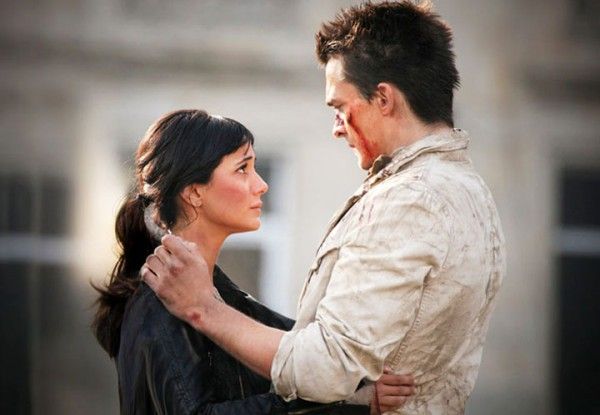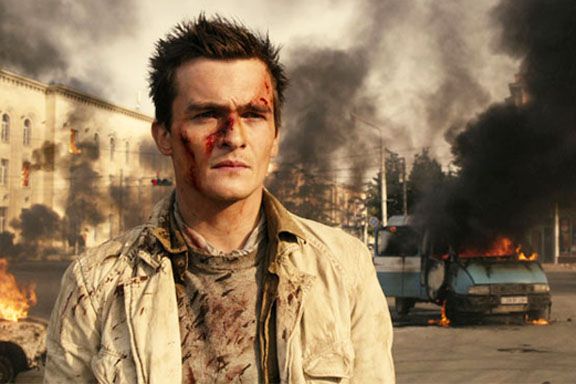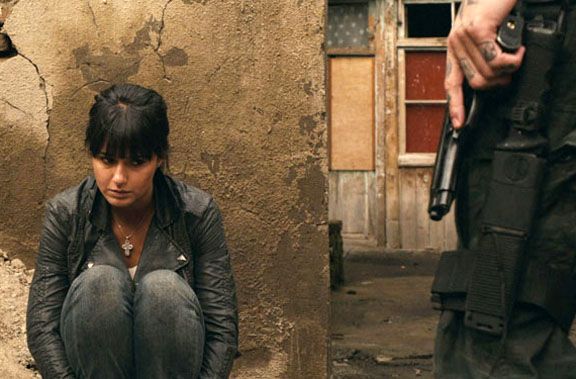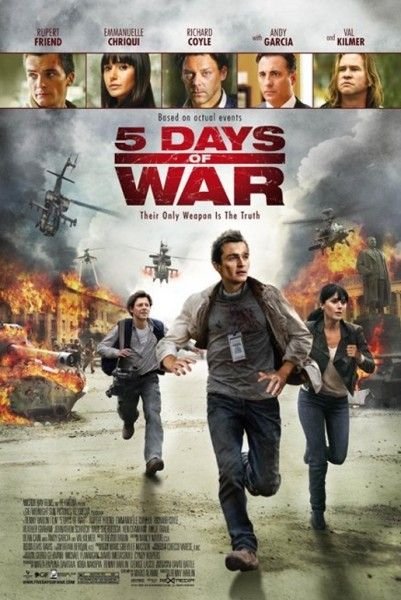Inspired by the real events of the devastating five-day war between Russia and Georgia in 2008, 5 Days of War is an action-packed thriller that centers around an American journalist, named Thomas Anders (Rupert Friend), and his cameraman, who are caught in the combat zone after rescuing a young woman (Emmanuelle Chriqui) from the aftermath of the first Russian airstrikes against Georgia. As the three attempt to escape to safety, they happen to record the cold-blooded murder of innocent civilians, which they desperately want to broadcast for the world, in order to get the truth out.
Recently director Renny Harlin spoke with us about how there was only a blueprint for the script when he became interested in the project, and that telling the story from a journalist’s point of view offered the best way to make it relatable. He also talked about how emotional the experience of actually filming in Georgia was and the extent of support they got from the government and the people. And, he talked about what made him want to try directing television by taking on an episode of the hit USA series Burn Notice, how he’s hoping to do a sequel for The Long Kiss Goodnight with the writer of that episode (show producer Ben Watkins), and how he’s in development on a few different projects and is waiting to see which one comes together next. Check out what he had to say after the jump.
Question: How did this come about for you? What stage of development was the film in, when you got involved with it?
RENNY HARLIN: There was a blueprint for a script, not even a year after the actual war took place. Somehow the producer’s path crossed with me and I heard about this project. I started doing some research and realized that it was an amazing and largely untold story. I then hired a writer, named Mikko Alanne, whom I knew from before and who had written some interesting and dramatic political movies. Together, we dove into the research, went to the country of Georgia, met with a lot of the journalists, talked to refugees and soldiers and politicians, went online to human rights watch sites, and really tried to get a larger understanding of what had gone on and why, and then we developed the script together. At that point, we decided that rather than tell a story from the soldiers’ point of view, or anything else, we wanted to tell it from the journalists’ point of view. That felt, to us, like it offered us the best way to tell a relatable story, and also get the civilians really involved in it.
How did you go about making everything that you’d learned accessible for audiences who likely know nothing about what went on?
HARLIN: That was hard because there was a lot of misinformation in the international press about what had gone on. The war started on the first day of the Olympics in 2008, and the world’s attention was very much with the Olympics. There was a lot of information that wasn’t correct, but largely accepted by everyone. It confused us to really dissect the truth out of all the different stories, but we just did our best, in terms of getting the timeline of the war and how things had unfolded, and understanding what had led to all these events. It’s a huge geopolitical spider’s web. These things are never easy or simple, and they usually involve money for oil or some other minerals. It was just a tragic, traumatic story, to see how the people of this little country got almost wiped out completely.
Was it a challenge to find the balance between telling a story that feels real and still having those spectacular aspects that people expect from a war movie?
HARLIN: Definitely, that’s a challenge because you try to follow the truth, to a large extent, but at the same time, you’re not making a documentary. You’re making a movie, and you want the movie audience to have those different aspects that brings them to the theater, whether it’s action or drama or romance or humor. You want to have a blend of all that stuff, and that’s not easy. You don’t want to veer too far into action-adventure territory, and at the same time, you want to make sure that the mainstream audience that comes for the thrill, gets entertained.
How did going to Georgia and filming there help you, in understanding this story and these people?
HARLIN: It was a very emotional experience because the wounds of the war were still fresh on the people. For them, it was a momentous event that we were there to tell their stories. It was very emotional for me, and the cast and crew. Directing thousands of extras who had just gone through this a year prior, and their experience having been very raw and real, it had a really profound affect on all of us.
Were you hesitant at all about actually shooting on location there, or did you feel that was crucial?
HARLIN: That was just a given. After I saw the locations where these things had unfolded, it felt like it was a natural way to tell the story there. The challenge was to bring in crew from all over Europe and equipment, and to make it technically possible because Georgia doesn’t have a large filmmaking community or infrastructure. It felt like it was a very unique situation, compared to any other war, like the Vietnam War. Usually, there’s such a long time before the filmmakers get the stories or decide to tell the stories, and they are not shot in the actual location. It felt like a real unique privilege to be able to do it.
Were you surprised at the support and cooperation that you got from the people there and the government?
HARLIN: I was surprised at the extent of the support. I felt, from my first visit, that the people, in general, were incredibly thankful that we were there and they wanted to get their voice out there. They were frustrated that the rest of the world barely knew where Georgia was, let alone about this war. The government support was the big, pleasant surprise. It wasn’t like things were just given to us for free, but we were able to make very favorable deals, so that we could have this war machinery. We could make a movie that I would dare to say hasn’t been made in decades, where instead of doing things digitally, we were able to use real tanks and, in this case, 80 tanks in one scene and six fighter jets and eight helicopters and 5,000 troops. We did something that no filmmaker has been able to do in a very long time. Even though the CG technology has developed so much, there’s still something about the weight of objects and how things look when they are viscerally created.
How did having a cinematographer who had had experience as a war correspondent affect the look and feel of the film?
HARLIN: That was very crucial for me. I looked long and hard for the right cinematographer for the film, and then I came across Checco Varese, who has had a long career as a war photographer, starting in South Africa and South America, and then going to Rwanda, Kosovo, Bosnia, Iraq, Afghanistan, and so on. He hasn’t done that for years. Now, he’s doing feature films, but he has that path. Just sharing stories with him and listening to his experiences and being able to use him almost like a consultant was great. I could ask how they would do things in this kind of situation, and so could the actors, and they could really get a feeling from him for how a cameraman would behave in these kinds of very extreme situations.
What was it about British actor Rupert Friend that made him your first choice to play an America journalist?
HARLIN: That’s a good question. I met a lot of actors for all these parts. In terms of the main character, who is an American journalist, I just couldn’t find anybody that I felt was suitable. Rupert was a mixture of being a great actor and being a known face from various previous movies, but at the same time, being somebody who isn’t a big household star. That was important to me because I didn’t want to give away what was going to happen in our story. I like casting surprisingly, and I like placing actors in different roles that don’t turn out to be exactly what the audience expects. I’ve done that with actors like Samuel L. Jackson in Deep Blue Sea, and I wanted to do that with this film too. I think it’s important, when you’re trying to really get the audience involved, is to keep them guessing and not give them the safety net of knowing exactly who’s going to survive and how the different relationship are going to evolve.
What do you think it is about these war journalists that compels them to risk their lives on a daily basis to get these stories into the world?
HARLIN: Now more than ever, when these events unfold very rapidly, like we’ve been seeing in Libya, the journalists are right there in the thick of things. They don’t have any kind of protection and they have no weapons. They just have their cameras, their laptops and pens, and yet they attempt to tell these stories and dig out the truth from all the different, conflicting stories of misinformation that swirl around. The news cycle is very fast, so they have a hard time getting their stories out. Even if they do, a new story from tomorrow’s tragedy is already replacing what they just told.
For the role of Tatia (Emmanuelle Chriqui), was it important for you to find an actress that could be both vulnerable and strong?
HARLIN: Yes, I definitely wanted to find a woman who could accurately represent Georgian women. Georgian women are extremely strong. They thrive in the workplace, in politics, and in many areas of life. They have learned to live in conditions that are sometimes hard and challenging. And, they are very beautiful. I needed to be truthful to them. In Emmanuelle, I felt like I had found somebody who had the talent, the looks and who could play the strength and the vulnerable side of somebody who is faced with this very traumatic situation. I think she hit it right on and gave the right amount of strength to this character. I didn’t want a damsel in distress. I wanted somebody who would really represent the civilian population and their bravery in facing this war.
What made you decide to try your hand at directing TV and take on an episode of Burn Notice? Had you been a fan of that show?
HARLIN: Yes, I was a fan of that show. I thought it was extremely well written and visual. It has elements from one of the favorite movies that I directed, called The Long Kiss Goodnight, with Geena Davis and Samuel L. Jackson. I like drama with real emotion, humor and action. For the longest time, I’ve been developing a few TV projects for myself. To me, TV is an extremely exciting medium, even more than ever before. It’s so fast moving and so different from features, where you sometimes spend years developing one project. With TV, you prep your episode for a week, then you shoot it for a week, and then you do post-production for a week, and it’s done. I just found it extremely exhilarating and fun, and I definitely plan to do more of that. I hope to do it again on Burn Notice, and also other shows, where I feel like the writing is of the highest quality and the visuals are exciting.
How did you end up in a conversation with one of the show’s writer/producers about doing a sequel for The Long Kiss Goodnight? Was that something you had been thinking of because the show had a similar feel to that film?
HARLIN: That’s a good question. I’ve been asked, over the years, by a lot of fans about a sequel for The Long Kiss Goodnight, and a lot of blogs and websites write about it, so it’s a constant thing. And, I’m friends with Samuel L. Jackson and he’s said that, when he travels the world, he gets more questions asked about that than anything else, and that people quote dialogue from the movie, even more than from Pulp Fiction. So, I’ve been talking with Sam for a while about doing a sequel and have just been waiting to find that right person to write it for me. When I got to know Ben Watkins, who wrote my episode of Burn Notice, I felt that he had exactly the sensibilities I wanted. He just happened to, out of the blue, tell me that he was the biggest fan of the movie, so I said, “Okay, let’s do it together.”
Do you have any idea what you’re going to be doing next?
HARLIN: Like always, in the movie world, you have a bunch of things that are cooking on various temperatures because you never know which one is going to be the next one. I have some more reality-based movies in development. I just wrote a screenplay for a very scary thriller that I really love. And, I have a big sea adventure that I’ve been developing. I’m not sure which one is going to go next. Right now, I’m just putting together casting and financing for a couple of them.
Having been a filmmaker for as long as you have been now, do you still feel as passionate for the craft now as you always did, or is it more difficult for you to find projects that you’re passionate enough about to dedicate so much of your time to?
HARLIN: It’s always been a challenge to find good material. In Hollywood, you tend to get pigeonholed to certain genres, and then when you try to do something different, it’s not always so easy. Obviously, you don’t want to keep repeating yourself, all the time. So, it’s a constant struggle for every filmmaker and actor to find something that you can really feel passionate about. It’s a profession like anything else. Sometimes you get involved in a film because you just love making movies and you want to keep working. Sometimes you’re lucky enough to find something that you really care about. Therefore, now I’m emphasizing developing my own projects and writing my own screenplays, so that I can do exactly what I like to do. Various different screenplays come to me every week, and it’s just a matter of reading a lot and finding what you like. In terms of passion, if there was any kind of low current of passion, at any point, doing 5 Days of War definitely reignited all that excitement, just because I had a chance to tell a story that really involved me personally, and my heart was really moved by it. I felt that I was able to tell a story that would actually mean a lot to those people whose story it is, and also to a lot of people who see the film and can take something home with them from this experience and discuss this with their friends and family. It really excited me. And, going to Georgia and seeing how people reacted to it has been such a powerful experience that now I just hope that, no matter what genre my movies are, I can find that kind of excitement for myself and also for the audience.
What do you think a film like 5 Days of War says about the human condition?
HARLIN: Unfortunately, it says that we haven’t learned anything, in the whole existence of the human race. We keep fighting over land and over different valuables. Georgia is an interesting example of that because it’s located between the Black Sea and the Caspian Sea, and it’s the gateway from Asia to Europe, and it has been a battlefield for thousands of years. In the case of Georgia, they are very Western-minded and very close to America. It’s a beautiful Mediterranean country, and one of the oldest Christianities in the world. They are very relatable people to us. To see them go through this superpower coming to take them over is shocking and it’s hard to believe that it can still happen.




